Daily Vocabulary Words: List of Daily Used Words in Leading Indian Newspapers
Hi there. Welcome to this special section @ Wordpandit. Our endeavour here is straightforward: highlighting daily vocabulary words that you would come across in leading newspapers in the country. We have included the following newspapers in our selection:
• The Times of India
• The Economic Times
• Hindustan Times
• Mint
• Indian Express
We are putting in extensive work to develop your vocabulary. All you have to do is be regular with this section and check out this post daily. This is your repository of commonly used words; essentially, we are posting a list of daily used words. Hence, this has significant practical application as it teaches you words that are commonly used in leading publications mentioned above.
Visit the website daily to learn words from leading Indian newspapers.
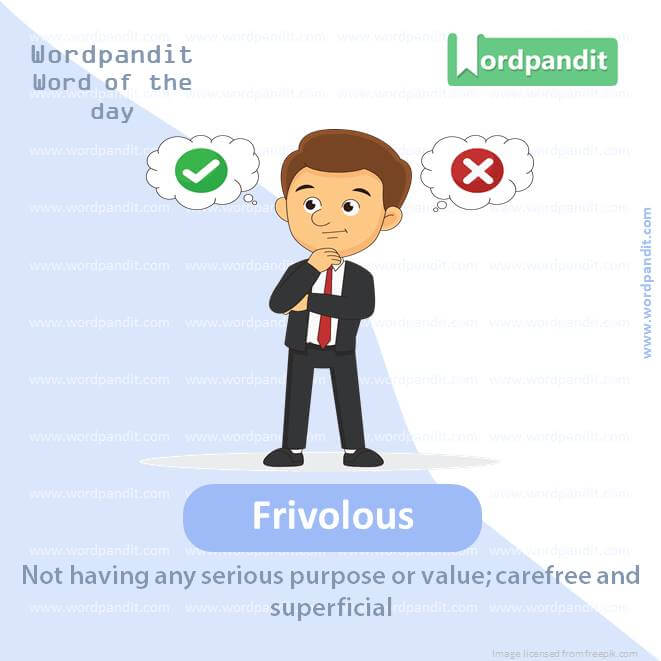
WORD-1: Frivolous
CONTEXT: It is wiser to run a country by cutting frivolous expenses and using the savings for its welfare.
SOURCE: Indian express
EXPLANATORY PARAGRAPH: Frivolous is like when you play silly games or laugh about something that’s not serious or important, just for fun.
MEANING: Not having any serious purpose or value; carefree and Superficial
PRONUNCIATION: friv-uh-luhs
SYNONYMS: trivial, silly, petty, trivial, insignificant, minor
USAGE EXAMPLE:
1. The teacher dismissed the student’s question as frivolous.
2. They spent the day engaging in frivolous activities.
3. The lawsuit was deemed frivolous and dismissed by the judge.
4. He had a frivolous attitude towards his studies.
WORD-2: Daunting
CONTEXT: Conducting elections is a daunting process as citizens’ money and time are at stake.
SOURCE: Indian express
EXPLANATORY PARAGRAPH: Daunting is when something seems so big or difficult that you feel a little scared or unsure about whether you can do it, like looking up at a really tall slide at the playground.
MEANING: Seeming difficult to deal with or intimidating (adjective).
PRONUNCIATION: dawn-ting
SYNONYMS: intimidating, challenging, formidable, disconcerting, discouraging
USAGE EXAMPLE:
1. The daunting challenge took all her courage to face.
2. Climbing the mountain was a daunting task.
3. He found the prospect of speaking in public daunting.
4. The extensive syllabus appeared daunting at first.
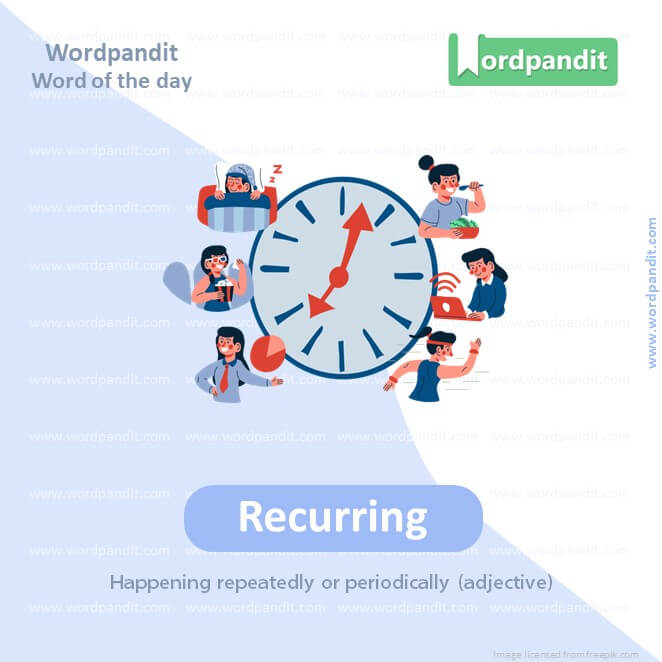
WORD-3: Recurring
CONTEXT: One Nation One Election and a single voter list offer a “one-stop solution” to mitigate the stress caused by the recurring election cycle.
SOURCE: Indian express
EXPLANATORY PARAGRAPH: Recurring is when something happens over and over again, like having pizza every Friday night or watching your favorite cartoon every Saturday morning.
MEANING: Happening repeatedly or periodically (adjective)
PRONUNCIATION: re-kur-ring
SYNONYMS: repetitive, periodic, repeated, continual, cyclic
USAGE EXAMPLE:
1. She had a recurring dream about flying.
2. The issue of parking was a recurring problem in the city.
3. He noticed a recurring pattern in the data.
4. The recurring meetings were scheduled every Monday.
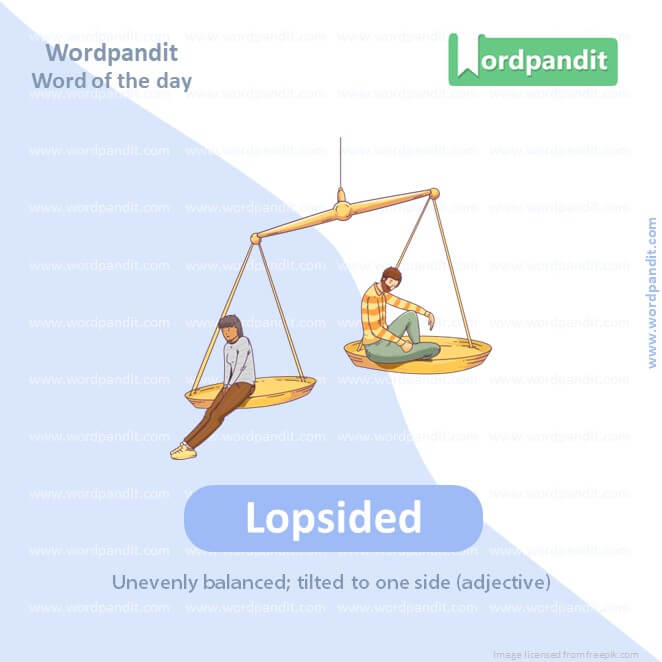
WORD-4: Lopsided
CONTEXT: The first few election contests in India were lopsided: Congress was the only organized political party, Jawaharlal Nehru was a colossus, and there were only pockets of resistance to the Congress’ juggernaut.
SOURCE: Indian express
EXPLANATORY PARAGRAPH: Lopsided is when something is uneven or tilted to one side, like when you build a tower with blocks and it leans more to one side than the other.
MEANING: Unevenly balanced; tilted to one side (adjective)
PRONUNCIATION: lop-syd-ed
SYNONYMS: uneven, unbalanced, asymmetric, skewed, disproportionate
USAGE EXAMPLE:
1. The cake was lopsided after it didn’t rise evenly in the oven.
2. The game ended with a lopsided score of 10-1.
3. Her smile was charmingly lopsided.
4. The debate was lopsided, favoring one viewpoint over the other.
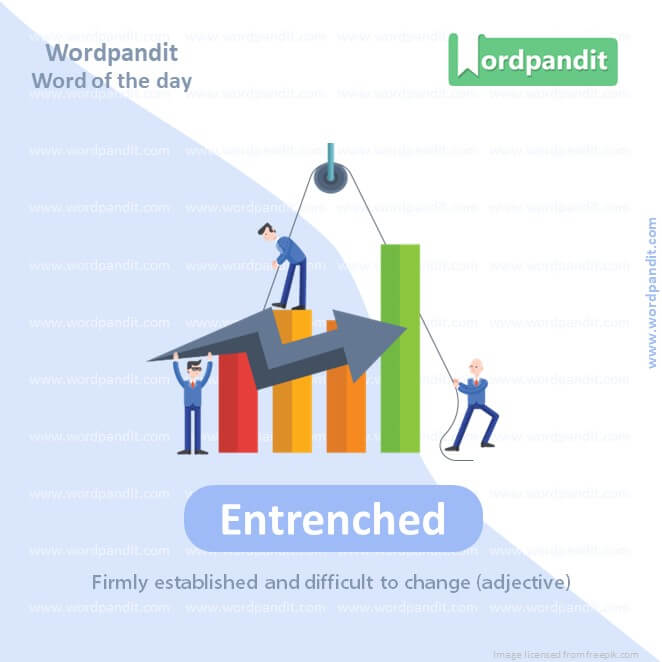
WORD-5: Entrenched
CONTEXT: The RLD, BJD and the TDP will realize what is in store for them if the BJP entrenched itself in the central government.
SOURCE: Indian express
EXPLANATORY PARAGRAPH: Entrenched is like when something is so deeply set or stuck in place that it’s hard to change, like when you build a sandcastle with walls so deep that the water can’t wash it away.
MEANING: Firmly established and difficult to change (adjective)
PRONUNCIATION: en-trenched
SYNONYMS: ingrained, rooted, embedded, fixed, deep-seated
USAGE EXAMPLE:
1. The company has an entrenched position in the market.
2. His beliefs were so entrenched that nobody could change his mind.
3. The practices have become entrenched over many years.
4. Entrenched corruption was a major issue in the organization.
WORD-6: Imbibed
CONTEXT: Many people will actually welcome centralism because true democratic values have not been fully imbibed in our family, social or political structure.
SOURCE: Indian express
EXPLANATORY PARAGRAPH: Imbibed is like when you drink something, but it can also mean when you take in something like a story or knowledge, absorbing it like your body absorbs water.
MEANING: Absorbed or taken in, either by drinking or through the mind (verb).
PRONUNCIATION: im-bahybd
SYNONYMS: consumed, absorbed, ingested, assimilated, taken in
USAGE EXAMPLE:
1. He imbibed a lot of knowledge during his studies.
2. She imbibed the tranquil atmosphere of the countryside.
3. At the party, he imbibed too much wine.
4. The sponge quickly imbibed the spilled water.
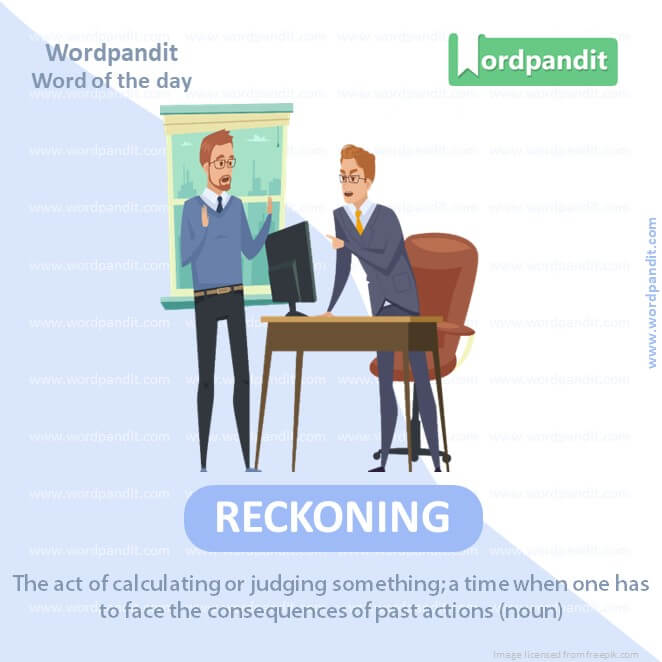
WORD-7: Reckoning
CONTEXT: In that moment of global reckoning about America’s use of military force and the destruction that would invariably follow
SOURCE: Indian Express
EXPLANATORY PARAGRAPH: Reckoning is like when you count or figure something out, like adding up your score in a game to see if you won or figuring out how many candies you have.
MEANING: The act of calculating or judging something; a time when one has to face the consequences of past actions (noun)
PRONUNCIATION: rek-uh-ning
SYNONYMS: calculation, estimation, judgment, accounting, assessment
USAGE EXAMPLES:
1. The final reckoning showed they had spent more than they earned.
2. He was at the day of reckoning for his actions.
3. By my reckoning, we should arrive by noon.
4. The event was a moment of reckoning for the company.
WORD-8: Cueing
CONTEXT: The response: loud boos, with the producer of the show cueing the music to get them off stage.
SOURCE: Indian Express
EXPLANATORY PARAGRAPH: Cueing is like giving a signal or a hint to someone to do something, like nodding your head to show it’s time to go or whispering to remind them to say “thank you.”
MEANING: Giving a signal or prompt to someone, directing the next action (verb).
PRONUNCIATION: kyoo-ing
SYNONYMS: signaling, prompting, indicating, gesturing, hinting
USAGE EXAMPLES:
1. The director was cueing the actor to start his monologue.
2. She was cueing him to keep quiet during the meeting.
3. The music cueing in the play helped set the scene.
4. Cueing the lights, the show began.
WORD-9: Vantage
CONTEXT: It has enabled me to bear witness to a lot of history and a lot of elections and it has made me learn how to view political events and changes from a vantage point of some distance.
SOURCE: Indian Express
EXPLANATORY PARAGRAPH: Vantage is like having the best spot to see something, like being at the front of the line to see a parade or climbing to the top of a hill to look around.
MEANING: A place or position affording a good view of something (noun).
PRONUNCIATION: van-tij
SYNONYMS: viewpoint, perspective, standpoint, position, advantage
USAGE EXAMPLES:
1. From the hilltop, they had a vantage point over the valley.
2. He moved to a better vantage to watch the game.
3. The tower offered an excellent vantage of the entire city.
4. Photographers sought the best vantage for their shots.
WORD-10: Conclave
CONTEXT: This scheme that turned ‘black’ money snowy white as soon as it became a political donation was ‘not perfect’ as the finance minister admitted at the India Today conclave last week.
SOURCE: Indian Express
EXPLANATORY PARAGRAPH: Conclave is like a secret meeting where a group of people come together to talk about important things and make decisions, like when your teachers have a meeting in the classroom without any students.
MEANING: A private or secret meeting, especially one with a specific purpose (noun).
PRONUNCIATION: kon-kleyv
SYNONYMS: meeting, assembly, gathering, summit, conference
USAGE EXAMPLES:
1. The leaders held a conclave to discuss the new policy.
2. The cardinals entered the conclave to elect the new pope.
3. Details of what happened in the conclave remained confidential.
4. The company executives went into a conclave to decide the future of the business.
Vocabulary In English
Dancing within the vibrant scheme of language learning, a profound understanding of ‘vocabulary in English’ is indispensable. These sets of words, serving as the pillars of communication, lay the foundation for effective and fluent exchange of ideas. Yet the question begs, how should one go about mastering ‘vocabulary in English’?
Embracing ‘vocabulary in English’ demands a well-rounded understanding, far more than mere surface memorization. It is of immense benefit to explore a variety of reading materials, such as books, newspapers, magazines, and online content. This broad exposure yields a practical understanding of how and when words are used, thereby enriching your command over ‘vocabulary in English’.
To aid the learning of ‘vocabulary in English’, memory-enhancement techniques come to the rescue. Regularly using flashcards, or applications that reinforce the principles of spaced repetition, can drastically improve memory retention. Aiding this, the use of mnemonic devices to associate words with unique stories or images in your mind has shown to greatly assist recall.
Practical application further paves the way for mastering ‘vocabulary in English’. By using the learnt words actively in your daily conversations, you cement their grasp in memory and understand their practical usage.
Rounding off, regular reviews of ‘vocabulary in English’ is the secret ingredient in the recipe for success. Consistent revision sessions solidify the retention of previously learned words and maintain a fresh connection with them.
To conclude, the path to mastering ‘vocabulary in English’ is an insightful journey, made enjoyable with diverse resources, effective memory techniques, practical usage, and regular review sessions. As you immerse into this linguistic voyage, every word you learn brews a unique tale, enhancing the narrative of your language proficiency and guiding you towards becoming a skilled communicator.













